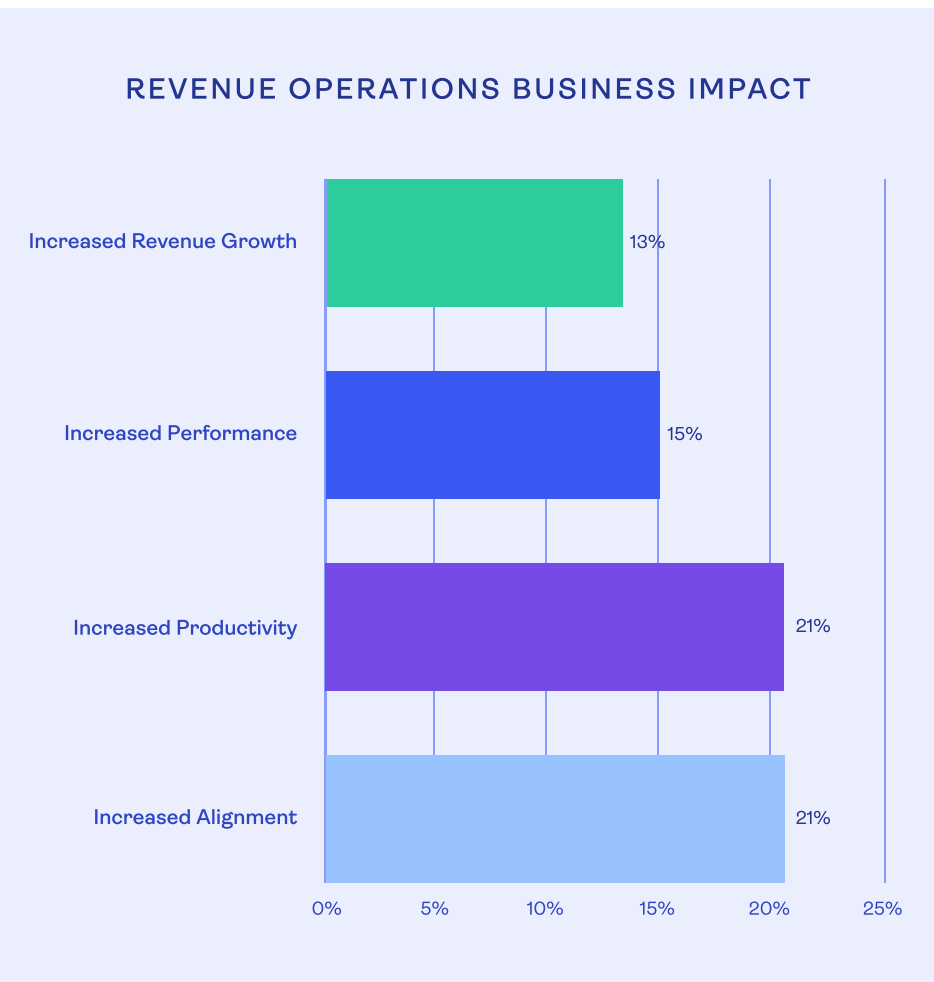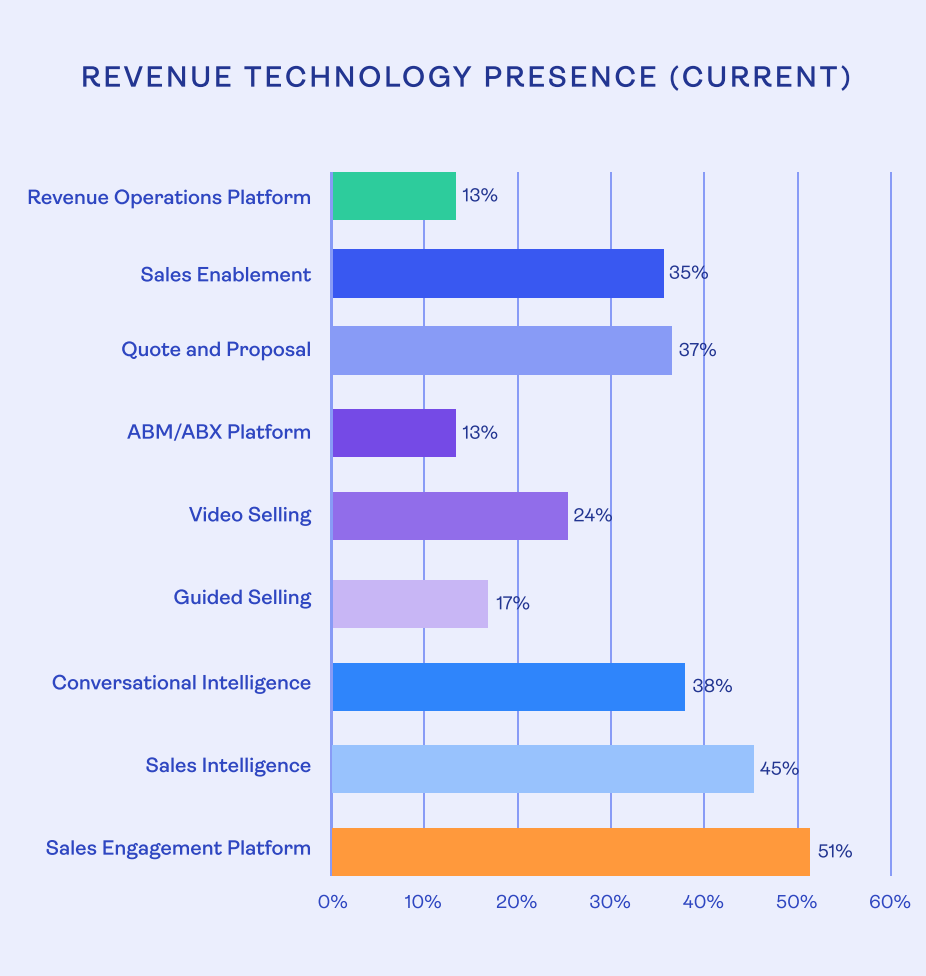Revenue Operations (RevOps) ROI refers to the measurable return on investment generated by aligning sales, marketing, and customer success operations under a unified strategy. An ROI-optimized RevOps function improves efficiency, enhances data accuracy, shortens sales cycles, and drives predictable revenue growth by eliminating silos and streamlining processes across the buyer journey.
The Ultimate Guide to Revenue Operations: RevOps Strategy & Benchmarks
Revenue Blog > The Ultimate Guide to Revenue Operations: RevOps Strategy & Benchmarks
11 min readFebruary 24, 2024As the cost to acquire customers continues to increase and conversion rates continue to decrease, it’s never been more important to understand how to win, keep and grow customers. This necessity has given rise to an important movement in the last handful of years called Revenue Operations (RevOps).
What is Revenue Operations
The definition of Revenue Operations is the convergence of marketing, sales and customer service into a unified strategy and organization. RevOps has been picking up speed among B2B companies, as leaders look to it as a solution to siloed inefficiencies and as a way to boost productivity and growth.
It’s also become a necessity to meet customer expectations. According to Salesforce, 76% of customers expect consistent interactions across departments, while 54% of customers say it generally feels like they’re communicating with separate departments, not one company. RevOps is the only function that can address this disconnect.
5 Reasons Why RevOps Matters in 2025
We recently put out our second annual RevOps Report. All signs point to the RevOps model gaining steam. Based on our research, here are some of the top reasons why RevOps should be a critical component of your revenue strategy.
RevOps is Adoption is Growing
Nearly half (48%) of companies now have a RevOps function, up 15% over last year. An additional 11% plan to adopt it in the next year. Revenue Operations is known to impact revenue growth (13%), revenue productivity (21%) and Sales and Marketing alignment (21%), making it a huge opportunity for a significant number of companies.
Joint Revenue Team Meetings Show Value
Many companies struggle with Sales and Marketing alignment, but research reveals that a simple emphasis on meeting cadences and joint action items could go a long way to improve alignment.
Your CEO Probably Cares About RevOps (Or Will Soon)
23% of CEOs are responsible for Sales and Marketing alignment, actually making them more likely than the Head of Revenue Operations (14%), Chief Marketing Officer (15%) or Chief Revenue Officer (CRO) (13%) to have alignment duties. This may speak to the need for a high-powered executive with a mandate to enforce change.
Shared Analysis is the New Normal
54% of companies report having regularly scheduled “metrics analysis and planning” sessions to identify top challenges and areas of improvement opportunity. Only 15% did not have any meetings whatsoever, indicating that alignment among Sales and Marketing teams is on the rise.
Even Earlier Stage Companies are Adopting RevOps
The most common period in a company’s growth to start a RevOps function is between $5M – $20M ARR, with the second most common being $20M – $50M ARR.
Who Should Care About RevOps?
A RevOps model benefits a multitude of roles across a business. Here are some common roles that benefit most from adopting a RevOps model.
Sales Leaders/Managers
In a RevOps model, Marketing will typically be accountable for more than just lead gen, they will be on the hook to work with sales to ensure that they are delivering leads that convert to customers. That is a good thing for sales leaders. Working in lock-step with marketing toward shared goals is almost certainly going to drive better results than working in silos.
Marketers
Having a team dedicated to optimizing lead pickup, follow-up and conversion rates is good for Marketing, period. No marketer wants hard-won leads getting routed to the wrong place (or never routed at all). RevOps can help ensure that more generated leads turn into customers.
Historically, if a sales team missed targets it was only a matter of time before the conversation shifted to lead quality. And unfortunately, blame games and finger pointing between Sales and Marketing was relatively common. The RevOps model helps solve this with shared metrics and technologies.
It’s also powerful to have a RevOps team ensure that Sales tech and Martech works harmoniously.
CEOs
No CEOs want to listen to Sales and Marketing argue with each other about whose fault it is that goals didn’t get hit. CEOs want to see reliable growth and a RevOps model is often the fast-pass to getting there.
Sales and Marketing Operations Professionals
If you’re currently in a sales or marketing ops role you have the opportunity to become an true hero by creating alignment and feedback loops between Sales, Marketing, CS and other revenue-generating departments.
It’s no wonder that we’re seeing more sales and marketing ops professionals transition to RevOps roles. We’ve not only seen this change at customer companies, we’ve made this shift at our own company too.
Top RevOps Benchmarks of 2025
Straight from our recent Customer Acquisition and RevOps Team Benchmarks report, here are some key findings that you can use to compare your own company with the dozens that we surveyed.
How Common is RevOps?
48% of companies have a Revenue Operations function, which is a 15% increase year-over-year from 2021. 11% of companies are planning to introduce the function next year.

The Benefits of a RevOps Model
When a Revenue Operations function is introduced, 21% of companies see both increased alignment and productivity (which often increases operating margin as measured by revenue per employee), with another 13% experiencing increased revenue growth. Sales and Marketing alignment also benefits, with 21% of companies seeing an improvement in alignment between teams.

When Should Your Company Introduce a RevOps Model?
When Is Revenue Operations Most Commonly Introduced? If a company is wondering when to introduce Revenue Operations, a good benchmark would be $5M, since that’s when the benefit of Revenue Operations becomes most evident.
What Revenue Technology Are Sales Teams Currently Investing In?
Conversational Intelligence increased the most this year, with 38% of companies reporting using Conversational Intelligence up from 25% in 2021. Guided Selling Platforms also increased by 7%.
Both Conversational Intelligence and Guided Selling tools have a strong focus on communication and can be used easily in a hybrid work setting, which would suggest that the market is trending towards more human oriented, flexible selling solutions that can adapt to multiple environments.

Which RevOps Tech Are Companies Planning to Buy Soon?
Companies planning to invest in a Revenue Operations platform doubled year over year, highlighting the growing recognition of RevOps as a critical function investment. In addition to the 13% that already have a RevOps platform, 14% of companies will implement one in 2024.
With 38% of companies already having adopted Conversational Intelligence, 13% plan to adopt it as a new investment, suggesting that the segment is more mature entering 2025. As Conversational Intelligence evolves, companies are likely to demand more of their solutions, such as AI-driven insights to help their sellers make the most of the technology.
Sales Enablement tech is being evaluated by 16% of companies in 2024, the same as last year. This is somewhat concerning in light of the Great Resignation that so many companies have weathered. Almost 50% of companies have no formalized and automated way to ensure their sales ramp up time is speedy and effective. Those companies that are prepared to hire, quickly ramp and continuously evolve their sales resource competencies will be positioned to win in 2025 and beyond.
Essential Skills You Need for RevOps Roadmapping Success in 2025
Roadmapping is a key ingredient for RevOps success. A strategic operational roadmap not only drives alignment across your organization but also helps keep teams accountable and focused on the work that will have the biggest impact on revenue. S
till, many teams find it difficult to make road mapping a sustainable part of their operations culture.
Over the past several years, we’ve worked with dozens of SaaS companies and helped take them through the roadmapping process. Here’s what we’ve learned.
What is a RevOps Roadmap?
If you and your team are new to RevOps roadmaps, consider them a visualization of how you plan to improve the customer experience over time.
Like a product roadmap, your RevOps roadmap serves as a source of truth for your revenue team and the organization, showing what work is being done and why.
While we’re at it, here a few things a RevOps Roadmap is not:
- Set in stone. It can and should change as priorities shift and your organization grows.
- A backlog. Every item should be prioritized and planned based on its projected revenue impact.
- A list of tasks to be completed. Roadmap items should be organized by theme and can be broken down into milestones, but should be outcome-based and time-bound.
There are 4 main skills required to build and maintain an effective roadmap. Committing to strengthening these skills is key to maturing as a RevOps team.

Skill 1: Initiative Generation
How do you turn gaps you’ve identified into initiatives for your roadmap? Once you’ve defined your goals, you’ll need to ideate and come up with the work. And now you’ll be taking on across your revenue team to drive those goals forward.
When coming up with these initiatives, make sure you’re being consistent with leveling; all items on your roadmap should be at similar levels, rather than having some very granular tasks alongside big picture initiatives.
Skill 2: Buy-In & Measurement
If you want to make roadmapping a sustainable part of your operational culture, you’ll need to get buy-in; not only on the process itself, but also on the strategy and initiatives that end up on the roadmap. As your team starts planning work more intentionally, you’ll also need to commit to regular, cadenced communication that gives the rest of the organization visibility into what work is being done and why.
Another key function of the roadmap is to enable the team to measure the impact of work over time. Through regular benchmarking and evaluation, you’ll be able to see what’s been accomplished each quarter, what impact it’s had on the business, and how you can improve on your process in the future.
Skill 3: Prioritization
One of the main differences between a strategic RevOps roadmap and a task list or backlog is that all work planned on a roadmap has been prioritized based on its predicted impact on the business. This ensures the revenue team is always focusing on the highest-impact work and making meaningful progress towards the organization’s high-level revenue goals.
You can determine an initiative’s impact by looking at the gap it’s tied to. What would that gap mean for your revenue if it didn’t exist? Would you be seeing more qualified leads? Less lead leakage at handoff points? Faster sales cycles?
There are other factors you should take into consideration, as well:
- How urgent is the work? Is it a fire that needs to be fixed quickly to prevent any negative impact on the org?
- What level of effort is needed? Is it a huge strategic initiative requiring lots of time from multiple resources?
Skill 4: Utility
Utility keeps your roadmap alive over time, and if you don’t commit to it, your roadmap will fail. The only way an operational roadmap can be of any use to your organization is if it’s shared and contextualized so that everyone can refer to it as a source of truth. This is why communicating what’s on your roadmap and the progress on each item is just as important as having regular meetings to keep your roadmap up to date.
Creating a meeting cadence early on and sticking to it is a good way to start building the utility muscle that will help ensure your roadmap accurately reflects your strategy.
Why Roadmaps Fail
When roadmaps fail, it’s usually not because work isn’t getting done. Instead, it’s about how that work is being prioritized, planned, and communicated across the organization. Some common problems we’ve seen lead to failed roadmaps:
- More than one roadmap is being used across the company and people aren’t sure which is the most up-to-date or the ‘right’ one to refer to
- Utility meetings aren’t prioritized so the roadmap becomes static and loses its value
- The need for and impact of a strategic roadmap aren’t communicated to stakeholders and buy-in isn’t achieved
- Work isn’t prioritized and the roadmap effectively becomes a task list or backlog
- Clear definitions of done aren’t established for each initiative so it becomes hard to gauge progress accurately
- Items don’t have a clear owner, so no one is held accountable to the work
Getting Started with Roadmapping
Before you start building your roadmap, you’ll need to sit down with your revenue team to map out your customer journey and identify gaps throughout. Those gaps will be your jumping-off point for initiative generation, the first skill necessary for road mapping maturity.
It’s okay if this all feels a little daunting. As operators, we often have a million things happening that all seem important, making it hard to think about narrowing down that list. The thing to keep in mind is that even small changes to the way your team approaches strategic planning will go a long way.
To learn more go through the ultimate guide to RevOps and RevOps benchmarks.
What is the ROI of RevOps?
How Aligned are Sales and Marketing Teams?
Alignment between Sales and Marketing teams has remained fairly stagnant since the last edition of this report, with only a 2% increase in companies reporting that they’re “very aligned” and a 1% decrease in companies reporting that they’re “somewhat aligned.”
Meanwhile, 29% of companies report a neutral or negative alignment between Sales and Marketing.
This stagnation suggests that it remains difficult to execute despite all the talk about Sales and Marketing alignment (to the point that it’s practically become a buzzword). Embracing a new model can feel daunting, but an all-in-one RevOps platform can help make the transition far easier.
Looking for more benchmarks?
Listen to our podcast on What is Revenue Operations
Revenue Operations FAQs
What is Revenue Operations (RevOps)?
Revenue Operations is the alignment of sales, marketing, and customer success under a unified strategy. Its goal is to remove silos, drive operational efficiency, and create consistent customer experiences across the entire revenue funnel.
When should a company introduce a RevOps function?
RevOps is most commonly introduced between $5M–$20M in ARR. This is the stage where alignment, scalable systems, and data integrity become critical for continued growth and revenue optimization.
How does RevOps improve sales and marketing alignment?
By centralizing metrics, tech, and strategy, RevOps holds both teams accountable to shared goals like lead quality, conversion rates, and pipeline velocity. Regular joint planning sessions and shared analysis reduce finger-pointing and improve performance.
What are key RevOps metrics companies should track?
Common benchmarks include qualified lead velocity rate, revenue per employee, sales cycle length, and marketing-to-sales conversion rates. Tracking these helps teams identify gaps and prioritize work that improves revenue outcomes.
Why do RevOps roadmaps often fail?
Roadmaps fail due to lack of prioritization, unclear ownership, poor communication, or inconsistent use. For a roadmap to succeed, it must be dynamic, outcome-focused, visible across teams, and regularly reviewed to ensure progress and accountability.
Categories:
